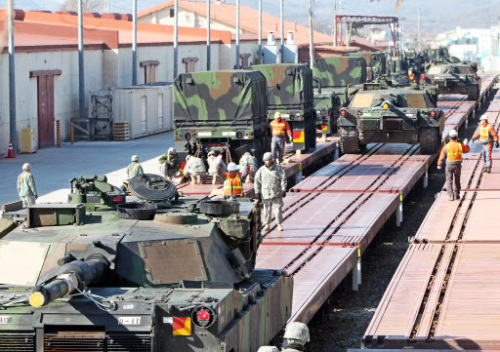South Korea and the U.S. have agreed to a joint investigation into the alleged burial three decades ago of Agent Orange at a U.S. military base in Waegwan, North Gyeongsang Province, a senior government official said Sunday.
“Recognizing the urgency and importance of the matter, the U.S. has actively engaged in consultations with us. For a prompt, transparent resolution of the issue, the two sides have agreed to quickly proceed with a joint investigation,” Yook Dong-han, vice minister of the Prime Minister’s Office, told reporters.
“Details on how to carry out the probe will further be discussed. When the joint inquiry team is set up, it will conduct the investigation inside Camp Carroll and in its surrounding areas.”
“Recognizing the urgency and importance of the matter, the U.S. has actively engaged in consultations with us. For a prompt, transparent resolution of the issue, the two sides have agreed to quickly proceed with a joint investigation,” Yook Dong-han, vice minister of the Prime Minister’s Office, told reporters.
“Details on how to carry out the probe will further be discussed. When the joint inquiry team is set up, it will conduct the investigation inside Camp Carroll and in its surrounding areas.”

The agreement was made between Lim Gwan-bin, deputy minister for policy at the Ministry of National Defense, and Lt. Gen. John D. Johnson, commander of the 8th U.S. Army, he explained.
Yook made the announcement after he presided over a government taskforce formed to coordinate measures to deal with the case, which some said could undermine the six-decade bilateral alliance and trigger anti-American sentiment.
The investigation comes after a U.S. cable TV network, citing three former American soldiers, reported that hundreds of barrels of Agent Orange had been buried here in 1978.
Steve House, one of the former soldiers, told local media that about 600 barrels might have been buried near the helicopter landing facility of the camp, which is a central logistical support unit for U.S. Forces Korea.
The figure is far higher than the around 250 barrels KPHO-TV, a CBS-affiliate TV station in Phoenix, initially reported on May 13, further escalating public anxiety over the incident.
The revelation apparently put Seoul and Washington governments in a difficult situation, particularly as they have a variety of bilateral issues to coordinate, including those concerning North Korea and the free trade agreement.
Agent Orange is a toxic defoliant that the U.S. military used to clear jungles in the 1960s during the Vietnam War.
It is known to cause mental illness, cancer and fetal deformities. More than 33,000 South Koreans who participated in the Vietnam War suffered from the aftereffects of exposure to the defoliant.
On Saturday, a health and environment research institute under North Gyeongsang Province, collected samples of underground water from Waegwan-ri, Seokjeon-ri and Maewon-ri, which are adjacent to the camp.
The institute is examining the possibility that the defoliant leaked from the buried barrels and contaminated the water and soil.
Separately from the planned Korea-U.S. joint probe, a group of environmentalists and local residents will also examine water ― both on ground and underground ― flowing out of Camp Carroll and the soil around it on Monday.
The Environment Ministry will also conduct a survey of residents there to find out how they have used water and whether they have had any diseases from possible defoliant contamination.
The U.S. military is known to have sprayed defoliant south of the Demilitarized Zone from 1968-69 to more easily detect North Korean infiltrations into the South. The allegedly buried defoliant is reportedly leftover from what they used in the Vietnam War.
Some news reports here raised the possibility that the U.S. military might have hurriedly buried the defoliant here in 1978 as lawsuits related to contamination began around that time.
Some observers said that should the alleged burial of Agent Orange be confirmed, the U.S. military might shoulder the cost to address contamination issues. But they said that it would be difficult to punish those involved as there were no cases in which a U.S. soldier has been punished for environmental contamination.
In 2003, one U.S. civilian worker in the military was given a suspended six-month jail term after civic groups filed a suit against him for leaking poisonous liquid into the Han River from the Yongsan Garrison in central Seoul.
The U.S. maintains some 28,500 troops on the Korean Peninsula, who serve primarily as a deterrent against the North.
By Song Sang-ho (sshluck@heraldcorp.com)


















![[Today’s K-pop] BTS pop-up event to come to Seoul](http://res.heraldm.com/phpwas/restmb_idxmake.php?idx=642&simg=/content/image/2024/04/17/20240417050734_0.jpg&u=)